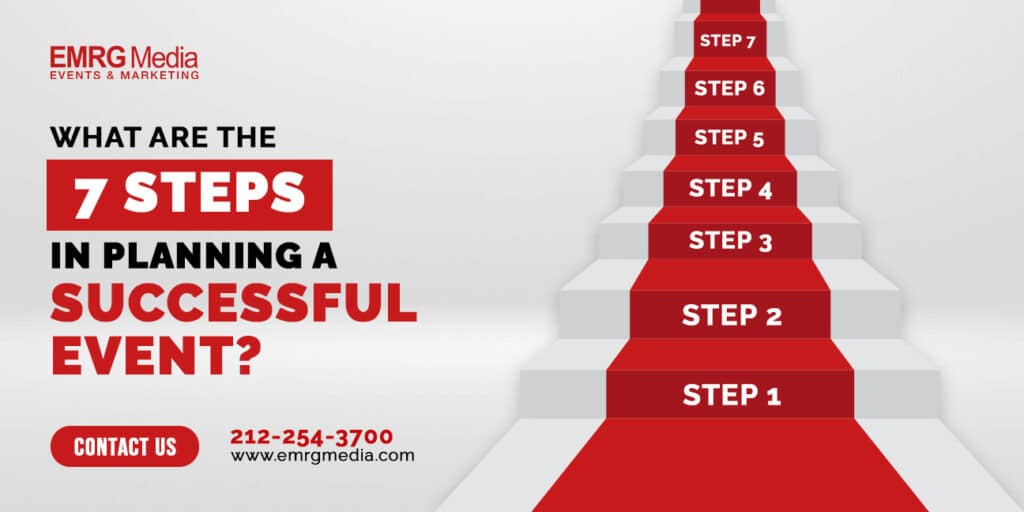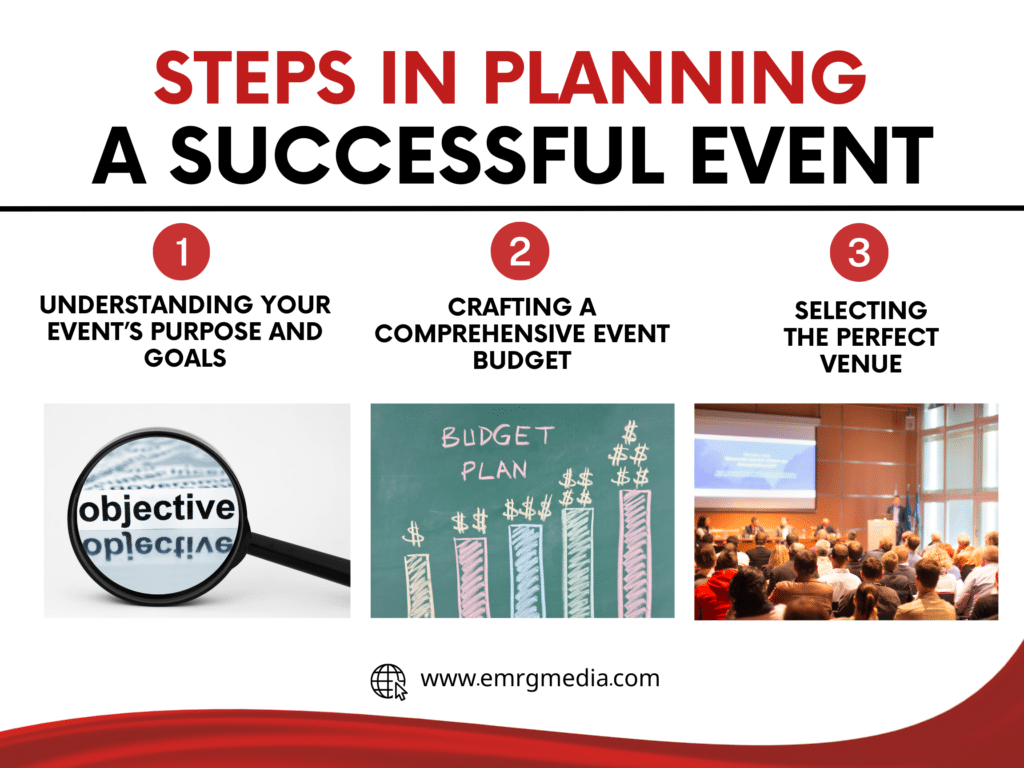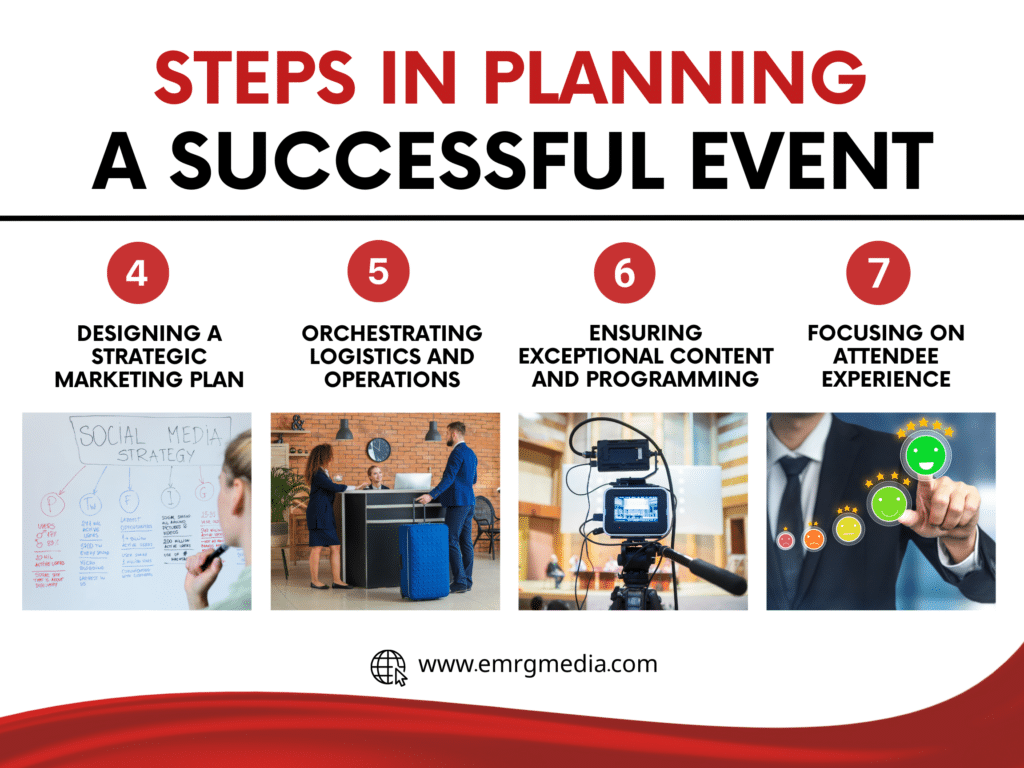Planning an event’s success is no small feat; it’s an art and science that requires meticulous attention to detail. With EMRG Media, you’ll dive into the essential steps in planning a successful event, from crystallizing your vision with clear event goals to wrapping up with insightful post-event analysis.
You’ll learn how to budget wisely without cutting corners and pick out the perfect venue that aligns with your theme. We’ll also share strategies for crafting a marketing plan that hits home with your audience, along with tips for ensuring seamless logistics on the big day.
Plus, we won’t overlook what truly makes an event memorable—the content and overall attendee experience—setting you up for success every step of the way.
Ready to learn about the steps in planning a successful event and turn your event vision into a reality?
Contact EMRG Media and let our team of event planners guide you through a seamless and unforgettable event planning experience in New York City.
Table Of Contents:
- Understanding Your Event’s Purpose and Goals
- Crafting a Comprehensive Event Budget
- Selecting the Perfect Venue
- Designing a Strategic Marketing Plan
- Orchestrating Logistics and Operations
- Ensuring Exceptional Content and Programming
- Focusing on Attendee Experience
- FAQs in Relation to Steps in Planning a Successful Event
- Success Served: Implement the 7 Steps in Planning a Successful Event Today
Understanding Your Event’s Purpose and Goals
Kicking off with the steps in planning a successful event starts with a clear vision.
You need to pinpoint what you want to achieve, which helps guide every choice down the line.
Let’s say you’re launching a new product. The goal isn’t just about showcasing this awesome innovation; it’s also about stirring up excitement and generating leads.
Or maybe you’re celebrating a company milestone – here, fostering team members’ camaraderie and honoring achievements takes center stage.
To make sure these goals aren’t just pie-in-the-sky dreams, they have got to be SMART: Specific, Measurable, Achievable, Relevant, and Time-bound.
For example, setting a target for attendee numbers or feedback scores makes tracking success straightforward.
 Identifying Primary Objectives
Identifying Primary Objectives
One of the steps in planning a successful event is identifying why you’re holding this event at all.
Is it educational? Are we networking? Maybe fundraising?
Understanding the core purpose shapes everything from content to venue selection.
It keeps things focused on delivering value that resonates with both your mission and your audience.
Determining Key Outcomes
You’ll then need tangible outcomes that reflect on those objectives—think sales targets for launch events or donor commitments for fundraisers.
These are not only benchmarks for success but also help rally your team around common aims.
This means having real figures in mind – how much buzz do we want online post-event? How many connections should each attendee walk away with?
Molding Attendee Takeaways
Last but certainly not least comes crafting what attendees will gain from their event experience—the takeaways that keep them talking long after closing remarks wrap up.
This could mean anything from practical knowledge at seminars or strong business relationships forged over cocktails.
Weaving these goals into every element ensures when showtime rolls around; each moment feels intentional because well…it is.
Crafting a Comprehensive Event Budget
When it comes to event planning, your budget is the map that guides you through every decision and purchase.
It’s not just about how much money you can spend; it’s also about understanding where each dollar goes.
A well-crafted budget helps keep track of expenses and income, making sure everything adds up for a successful event.
Establish Your Financial Framework
To kick things off, set your overall spending limit.
This might seem straightforward but remember: hidden costs lurk around every corner may it be large events or small.
Once you have this figure, allocate funds to different categories like venue hire, catering, event marketing, and entertainment.
You’ll want detailed planning as possible with these allocations—think lighting equipment rentals down to the last spotlight.
Having such specificity will let you spot potential savings and make informed decisions when weighing options against one another.
Prioritize Your Spending
Your next move is deciding what aspects of the event are non-negotiable versus those nice-to-have extras.
Essential items get first dibs on your budget pie; they’re crucial for achieving the goals laid out at inception time.
A practical approach could involve ranking each expense based on its impact on attendee experience or relevance to event objectives—a keynote speaker may rank higher than bespoke napkins for instance.
Maintain Flexibility Within Your Plan
No matter how precise we get in our initial plans sometimes life throws us curveballs—we need room in our budgets for unforeseen circumstances without jeopardizing other components of our plan.
This means setting aside a contingency fund usually around 10% – 15% depending upon risk assessment findings—to handle any surprises along the way gracefully rather than frantically scrambling come crunch time.
Track Expenditures Religiously
The most effective strategy here involves keeping meticulous records categorized neatly so nothing slips through cracks unnoticed during hectic periods leading up until showtime itself.
Consider using dedicated event management software which often includes tracking features alongside many other useful functions simplifying life significantly while managing complex projects like these here today under discussion now too indeed yes certainly absolutely positively assuredly.
Selecting the Perfect Venue
Finding a venue that echoes the essence of your event is not just about aesthetics; it should reflect both theme and purpose, offering an immersive experience to every attendee.
Aligning Venue with Event Vision
The journey starts by matching the vibe of your venue to your event’s soul.
For corporate galas or product launches, you might look into sleek conference centers in New York City, while more intimate affairs could shine at cozy boutique hotels or galleries.
Consider how different spaces can tell unique stories—does a historic mansion lend gravitas to an anniversary celebration? Will an art gallery spark creative conversations at a networking mixer?
Understanding Capacity and Flow
Beyond charm lies capacity: will this space comfortably hold all guests while fostering a smooth flow throughout the event?
We think beyond numbers here; we create breathing room within venues so connections form naturally among attendees without overcrowding.
Navigate through potential bottlenecks such as narrow hallways or limited restrooms because comfort is key.
When people feel good in their environment, they engage more deeply with the occasion itself.
Evaluating Amenities and Accessibility
Amenities aren’t mere conveniences—they’re essential components that keep events running seamlessly.
Does your chosen spot have cutting-edge audiovisual equipment on-site? How about Wi-Fi coverage across halls for those must-tweet moments?
We also make sure everyone can join effortlessly by checking ADA compliance and transportation links.
A perfect location isn’t truly perfect if it isn’t accessible for all invitees—including those coming from afar who may need nearby lodging options.
New York’s accommodation offerings are plentiful, but choosing wisely ensures nobody misses out due to logistics oversights.
Designing a Strategic Marketing Plan
A well-crafted event marketing plan is the engine that drives your event forward, turning interest into action.
At EMRG Media, we’ve seen how the right mix of promotions can fill rooms and create buzz. Let’s look at what makes an effective strategy.
 Finding Your Audience
Finding Your Audience
Determining who you want to reach is step one.
Use data from past events to identify demographics like age, profession, and interests.
Then tailor your message to speak their language; for example, LinkedIn ads might be perfect for professionals while Instagram could resonate more with a younger crowd.
To expand your reach further, consider partnerships with influencers or brands that share your target audience. They can help amplify your message in ways traditional advertising cannot match.
Choosing Promotional Channels Wisely
The channels you pick should align with where your audience hangs out online and offline.
A combination of social media advertising, email campaigns, email marketing effectiveness, and local press can give varied touchpoints to engage potential attendees from all angles.
Analyze each channel’s ROI by tracking metrics such as click-through rates and conversion rates after the event—this will inform future decisions on where best to invest resources.
Crafting Compelling Messaging
Your messaging needs not only to catch attention but also convey value quickly—the ‘why’ someone should attend over other options available to them.
Create clear calls-to-action (CTAs) that guide prospects through the decision-making process effortlessly.
Consistency across platforms helps reinforce recognition and trust in what you’re offering. “Come see why” or “Join us for”, followed by benefits or exclusive opportunities are CTAs that often perform well.
Leveraging Timing Strategically
Timing matters just as much as content.
Start building anticipation early with teasers about speakers or experiences awaiting attendees—but don’t reveal too much too soon!
Ramp up efforts closer to the date using urgency-based tactics like countdowns or limited-time offers which encourage prompt registration, the psychological impact of scarcity on decision-making.
Orchestrating Logistics and Operations
Smooth operations are the heartbeat of a successful event.
They’re like an expertly conducted orchestra, where every instrument has its part to play at precisely the right moment.
At EMRG Media, we’ve mastered this art through years of experience.
Transportation Coordination
We know that getting your guests to the venue can be as crucial as the event itself but with the right guidance on the steps in planning a successful event, we map out all transportation routes early on, ensuring there’s a seamless flow from point A to B.
Our partnerships with reliable transport providers mean attendees travel in comfort without any hitches.
Navigating New York City’s busy streets requires local knowledge and finesse—something our team has in spades.
We plan for contingencies too because city life is unpredictable but your event shouldn’t be.
Accommodation Management
Finding accommodation that meets everyone’s needs can feel overwhelming—but not for us.
We secure room blocks at hotels near your venue well ahead of time, often scoring discounted rates thanks to our connections across NYC’s hospitality industry.
We also provide detailed information packs for attendees covering everything from check-in times to amenities available so they feel prepared and taken care of even before they arrive.
On-Site Event Execution
The day of the event is showtime—it’s when all elements come together flawlessly or fall apart spectacularly.
But worry not; EMRG Media keeps the event running smoothly.
We have on-site project managers who are troubleshooters ready to jump into action should anything go awry—from tech glitches during presentations to last-minute seating changes.
- Meticulous planning meetings beforehand iron out potential kinks;
- Rigorous vendor checks ensure everyone knows their roles;
- A keen eye on attendee flow avoids congestion and keeps the energy high throughout the event.
So whether it involves directing traffic or setting up break-out sessions within minutes, you bet we’ve got it covered.
Ensuring Exceptional Content and Programming
We’ve seen firsthand how a well-curated agenda can turn an ordinary gathering into an extraordinary experience that resonates long after the last guest departs.
Crafting Engaging Content That Resonates
Start by identifying what your audience craves.
We leverage our expertise to tailor each program element to mirror attendees’ interests while aligning with your strategic goals.
This means going beyond standard presentations; think of interactive workshops or thought-provoking panels that spark conversations and connections.
But let’s not forget about speakers—their ability to connect and inspire is pivotal.
Our approach involves meticulously selecting not only experts but also great storytellers because they give life to data and facts through their narratives.
Incorporating Technology for Enhanced Engagement
In today’s digital age, incorporating technology is no longer optional—it’s essential for amplifying attendee engagement.
We use cutting-edge tools like live polling or event apps that allow real-time feedback and interaction among participants.
We also understand the power of virtual participation—our virtual events solutions bridge distances by providing immersive online experiences that rival physical attendance in terms of interactivity and impact on audiences across the globe.
Prioritizing Value-Driven Sessions
Focusing on value-driven sessions ensures every moment spent at the event contributes meaningfully towards attendees’ personal or professional growth.
To do this effectively, we balance informative elements with opportunities for practical application—such as breakout sessions where new skills can be practiced or group discussions where ideas are exchanged freely amongst peers.
This tailored approach reflects our deep understanding of what makes content truly engaging: relevance, applicability, interaction—and most importantly—a clear connection back to why everyone has gathered together in the first place: achieving common objectives through shared experiences.
Focusing on Attendee Experience
At the heart of every memorable event lies an exceptional attendee experience.
It’s about more than just what happens on stage; it’s creating a sense of welcome and excitement from the moment guests arrive to their final farewell.
Enhancing Engagement at Every Turn
To keep attendees engaged, think beyond traditional presentations.
Interactive workshops or networking opportunities let people actively participate rather than passively observe.
For instance, Forbes highlights networking as a key driver for professional growth—so we weave this into our events, allowing ideas and connections to flourish organically.
Tech tools can also play a pivotal role in boosting engagement levels. Apps that allow real-time polling or Q&A sessions make each person feel heard and valued.
Prioritizing Comfort for All Guests
A comfortable guest is an attentive one.
Seating arrangements matter greatly: they should encourage interaction while also providing enough space for personal comfort.
We choose venues known for both their ambiance and amenities because when someone feels good in their environment, they’re more receptive to new ideas—and that leads to better experiences overall.
Catering choices are equally crucial—they reflect thoughtfulness and consideration for diverse preferences and dietary needs which show your guests you care about them as individuals not just as attendees.
Amplifying Overall Enjoyment
The ultimate goal is to ensure everyone leaves with positive memories.
This could mean surprising elements like impromptu performances or thoughtful parting gifts that resonate with the theme of your gathering—the little things often leave lasting impressions.
We pay close attention to post-event feedback too because understanding past successes helps us elevate future gatherings even higher.
FAQs in Relation to Steps in Planning a Successful Event
What are the 7 steps in planning a successful event?
Define goals first -Craft your budget next- Find that perfect venue-Get marketing on lock- Sort all logistics out- Nail content and programming, and lastly, ensure attendees leave happy.
What are the 5 P’s of event planning?
Purpose, Planning, Promotion, Production, and Post-Event Evaluation shape every smashing event out there.
How important is venue selection in steps in planning a successful event?
Venue selection is crucial. Consider factors like capacity, location, and amenities. Ensure it aligns with the event’s theme and meets the needs of your audience.
Success Served: Implement the 7 Steps in Planning a Successful Event Today
Let’s recap the steps in planning a successful event.
Start by setting clear goals to steer your journey. Then, map out a budget that keeps you on track without skimping on quality.
Choose a venue that wows; it sets the stage for everything else. Nail down logistics early to keep things running like clockwork when it matters most.
Pack your event with content that captivates and resonates—this is what attendees will remember and talk about long after they’ve gone home.
Above all, focus on creating an experience; make every moment count for those who attend. And finally, learn from each event: analyze feedback to sharpen your skills for next time around.
Embark on a journey of flawless event planning process with EMRG Media. Contact us today to start crafting your next extraordinary event in NYC.
Let EMRG Media create your next unforgettable experience.



 Finding Your Audience
Finding Your Audience
